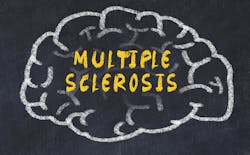A study of more than 22,000 people with multiple sclerosis has discovered the first genetic variant associated with faster disease progression, which can rob patients of their mobility and independence over time.
In findings published in Nature, an international collaboration of researchers report a genetic variant that increases disease severity.
The work was the result of a large international collaboration of more than 70 institutions from around the world, led by researchers from UCSF (USA) and the University of Cambridge (UK).
To address the mystery of MS severity, two large MS research consortia joined forces: The International Multiple Sclerosis Genetics Consortium (IMSGC) and The MultipleMS Consortium. This enabled MS researchers from around the world to pool the resources needed to begin to identify the genetic factors influencing MS outcomes.
The two consortia combined data from over 12,000 people with MS to complete a genome-wide association study (GWAS), which uses statistics to carefully link genetic variants to particular traits. In this case, the traits of interest were related to MS severity, including the years it took for each individual to advance from diagnosis to a certain level of disability.
After sifting through more than seven million genetic variants, the scientists found one that was associated with faster disease progression. The variant sits between two genes with no prior connection to MS, called DYSF and ZNF638. The first is involved in repairing damaged cells, and the second helps to control viral infections. The variant’s proximity to these genes suggests that they may be involved in disease progression.
The team also used statistical methods known as 'Mendelian randomization' to explore the importance of environmental effects and found that years of education and parental age reduced the severity of MS, while smoking worsened it. Finding correlation with these indirect measures of brain health further underlines the importance of resilience in determining the outcome of MS.
To confirm their findings, the scientists investigated the genetics of nearly 10,000 additional MS patients. Those with two copies of the variant became disabled faster.

